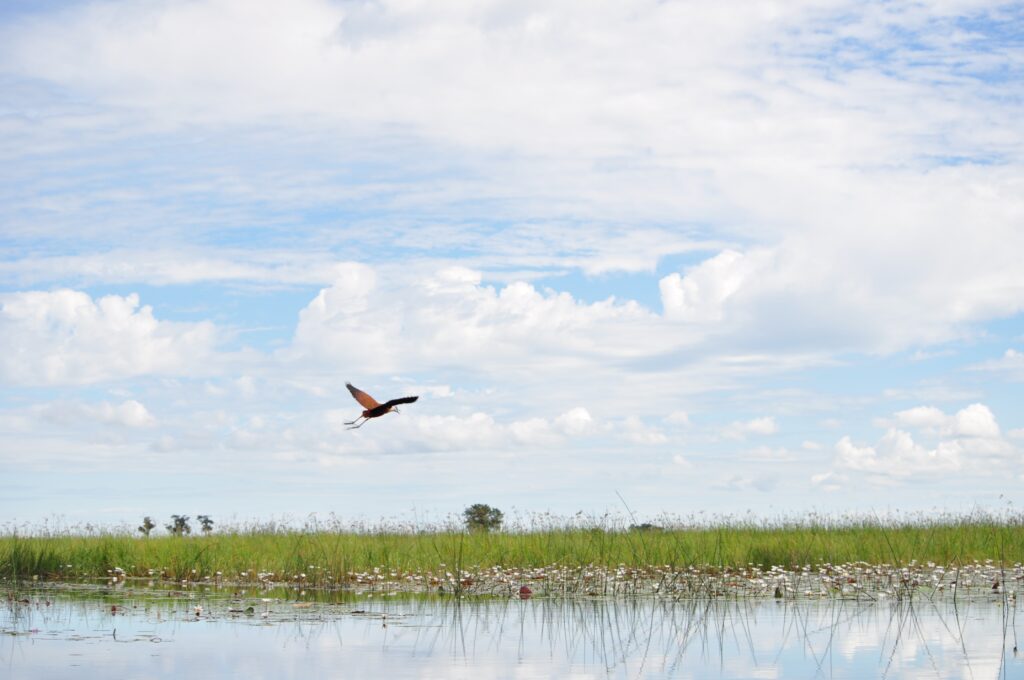As Canadian oil company pauses oil exploration in Okavango Basin, BirdLife International calls for oil drilling moratorium

The basin provides water for hundreds of thousands of people and includes a UNESCO World Heritage site and a Ramsar wetland of international importance.
Header image: A bird in flight in the Okavango Delta © Amaryllis Liampoti
Canada-based oil and gas company ReconAfrica, which has been exploring for oil in Namibia’s Kavango regions since 2021, has paused all operations in the country.
BirdLife International and other international organizations including Re:wild, have long supported the call from civil society organizations, local communities and local activists for an immediate halt to oil exploration in the Okavango River Basin.
ReconAfrica has a 13,200-square-mile lease area spanning Namibia’s Kavango regions and the Okavango Delta in Botswana.
“This shows the power of the collective,” said Reinhold Mangundu, a Namibian activist who penned an op-ed with Prince Harry, the Duke of Sussex about ReconAfrica’s exploration for oil in 2021. “The fears expressed by local communities and passionate conservationists were not unfounded, for they recognized the peril that loomed over the wildlife, waterways, and the very lives and dreams of those who call this land home. In this moment, we dare to envision a future where sustainable and responsible practices prevail, where the harmonious coexistence of humanity and nature takes precedence. May this be a wake-up call for the government to consider new pathways to a just and sustainable future. The seeds of change are there, we just need to combine them through new paradigms of progress, where the well-being of the region’s people and the delicate tapestry of its diverse biodiversity are cherished and safeguarded for generations to come.”
ReconAfrica’s exploration for oil has been embroiled in controversy in Namibia. In July 2022, local communities from Namibia’s Kavango regions brought a legal case against ReconAfrica in the country’s High Court, asking the Minister of Environment and Tourism to review or rescind the company’s environmental clearance certificate.
The local communities’ request was rejected and it is possible they may still be required to pay the government and ReconAfrica’s legal fees, which could total USD$35,000.
“ReconAfrica is leaving after insiders enriched themselves with tens of millions of dollars,” said Rinaani Musutua, trustee with the Economic and Social Justice Trust in Namibia. “They said they cannot afford to drill again unless they get a partner. Who will come to partner with a company with such a bad reputation? The company has disrespected the laws of Namibia and fails to treat people with dignity. Government must ensure that ReconAfrica pays a bond to cover the cost of cleaning up their toxic waste pits and that the company compensate the families harmed.”
In 2021, National Geographic reported that ReconAfrica had bulldozed a forest area and blatantly proceeded to illegally drill inside the Kapinga Kamwalye Community Conservancy, a protected area in Namibia’s ecologically sensitive OKavango regions. This drilling was conducted without consulting the local community land board as stipulated by law.
Civil society organizations and activists have expressed concern that the wastewater from ReconAfrica’s exploratory drilling risks leaking into the groundwater and ephemeral rivers upstream of the Okavango River and Delta in Botswana, which directly provides drinking water for more than 250,000 people in a region especially prone to droughts which is being exacerbated by the climate and biodiversity loss crisis.
In addition, hundreds of wildlife species depend on the freshwater rivers that feed the floodplains that make up the Okavango Delta, a Key Biodiversity Area, crucial to the persistence of the planet’s biodiversity. The Delta is also the terminal sink of the river system and has little or no outflow to the sea. Any contaminants that enter the delta via this river system would be impossible to remove and could significantly destabilize the fragile ecosystem upon which abundant biodiversity and local communities depend.
“The need to plan for and ensure a sustainable future for Africa, its people and its biodiversity has never been as critically urgent as it is now. The entire planet earth is in the middle of a devastating climate and biodiversity crisis. We are all affected. ReconAfrica’s incursion into the Kavango, flouting environmental laws and putting the Kavango’s Outstanding Universal Value at risk highlights some of the threats facing World Heritage Sites and Ramsar Sites across Africa. Whilst halting the oil exploration activities is a step in the right direction, we call for a permanent moratorium on oil exploration in the Okavango Basin to protect and conserve the region’s unique irreplaceable heritage, its pristine natural ecosystems that support all Life.”, said Julia Pierini, CEO BirdLife Zimbabwe, and Chair of the BirdLife International Council for the African Partnership (CAP).
“The decision by ReconAfrica to pause oil exploration activities in the Kavango Basin is welcome. Damaging ecologically sensitive areas while ignoring the plight of local communities is not acceptable. Digging out oil is not compatible with global efforts to decarbonise by 2050. The push by local communities and stakeholders against ReconAfrica demonstrates what can be achieved if we collectively advocate to save Nature.”, said Ken Mwathe Policy, Communications, and Climate Coordinator, BirdLife International Africa.
BirdLife will continue to join local activists and organizations in monitoring threats to the Okavango Delta.